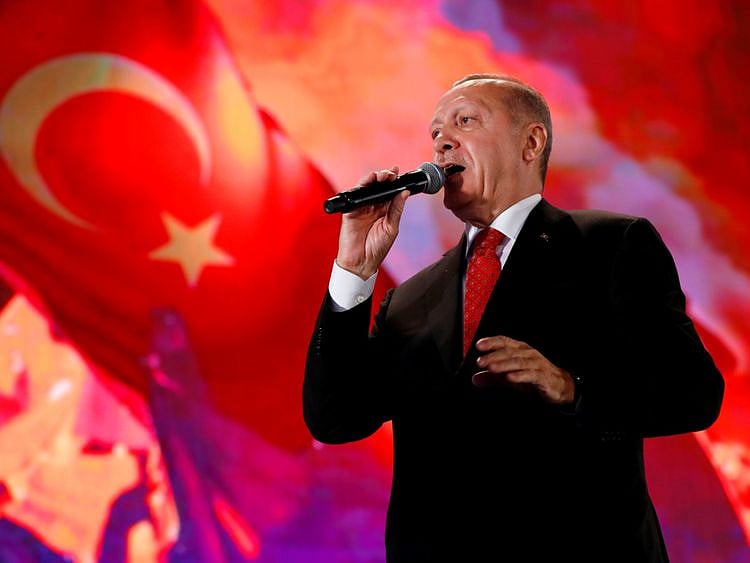Turkey’s diminishing returns in Syria
Ankara in a dilemma after Damascus’ call for uninvited foreign troops to leave Syria

It was a matter of time and it is now happening: Turkey finds itself face-to-face against Syrian government troops on the ground backed by superior Russian air force in Idlib province; the last rebel base. On Tuesday, regime forces were able to capture the strategic city of Khan Sheikhun and control parts of the highway between Hama and Idlib. Opposition forces, largely those belonging to Hayat Tahrir Al Sham (HTS) abandoned towns and villages that they had controlled for years. But more importantly for Ankara was the report that a Turkish military convoy was struck by Russian jets north of Khan Sheikhun.
Under the Astana process most of Idlib is designated as a de-escalation zone, but for months now the regime has been pushing to reclaim the rebellious province. The fate of the Turkish observation post in Morek, one of 12 in Syria, and the military convoy is unknown. Never before has the possibility of a military altercation between Damascus and Ankara been so real and so dangerous.
Turkish President Recep Tayyip Erdogan finds himself in an unenviable place. For years he has tried to implement a scheme in northern Syria that would result in a permanent presence on Syrian soil. His troops had intervened twice in the past five years to push back Syrian Kurdish forces, the SDF/YPG, east of the Euphrates. Turkey considers the United States-backed militias as an extension of the PKK, which Ankara labels as a terrorist organisation.
Also Read
Erdogan faces new threat: former allies‘Turkey will avoid US sanctions over S-400s’Is Turkey going rogue?In 2018, Turkey and the US, which had established a military presence in northeastern Syria, agreed on a roadmap to administer the key city of Manbij and remove Kurdish militias from there. That agreement was not carried out, much to Erdogan’s frustration.
Turkey has been accused of backing opposition forces in Idlib, including the HTS, which is also considered as a terrorist organisation with ties to Al Qaida.
Two weeks ago, the US and Turkey agreed to establish a joint operations centre in Turkey that will prepare the ground to implement a safe zone along Turkish-Syrian borders aimed at driving the SDF/YPG east of the Euphrates. But the two sides are yet to agree on the size and depth of the proposed zone. Damascus has attacked the US-Turkish agreement describing it as an aggression that serves “Turkey’s expansionist ambitions”.
And on Monday, Russian President Vladimir Putin reiterated support for the Syrian army as it carried out its advance in Idlib. Ankara condemned the air strike, in which three people died. The attack was “in violation of the existing memorandums and agreements with the Russian Federation”, it said.
Geopolitical card
The leaders of Russia, Iran and Turkey will meet next week in Ankara in an attempt to save the Astana process, but all indications suggest an inflection point is about to take place in the loose trilateral alliance. Russia is unlikely to support US-Turkish efforts to establish a safe zone and will continue to back the regime’s campaign to defeat the “terrorists” and recapture Idlib. For Tehran, which is under severe economic pressure as a result of biting US sanctions, supporting the Syrian government remains a high priority and a geopolitical card that its hopes to use in the future.
Erdogan, who has gambled with his strategic alliance with the US, is running out of options. His strategy in Syria has backfired and his support of the Syrian rebellion has come at a high price for Turkey and its regional agenda. His obsession with the failed military coup attempt in 2016 has led him to take some bold but reckless decisions; including the purchase of Russia’s air defence system, the S-400, which cost him the American made F-35 stealth fighter jet deal. With Russia’s aerial support, the Syrian army will push further into Idlib in the coming days and HTS fighters will likely withdraw deeper into Turkish territory. This is hardly the outcome that Erdogan was hoping for. Furthermore, the air strike against the Turkish military convoy sends a strong message to Ankara — that its Russian ally has priorities in Syria and preserving Turkey’s military presence in northern Syria is not one of them.
So the Turkish president is now facing a daring scenario: Will he risk sending his troops to face an advancing Syrian army backed by Russian air power? For Moscow and Tehran, the Syrian regime is fighting a just war to regain control over its national soil. How will Erdogan justify his presence on Syrian land? Russia and Iran had backed the government’s call for all uninvited foreign troops to withdraw from Syria.
For now, Erdogan’s immediate task will be to break the siege on Morek and retrieve his soldiers. But over the coming days, he will have to decide if he is willing to engage in a proxy war against the Syrian army and the Russians or count his losses and seek to save face.
— Osama Al Sharif is a journalist and political commentator based in Amman.
Sign up for the Daily Briefing
Get the latest news and updates straight to your inbox
Network Links
GN StoreDownload our app
© Al Nisr Publishing LLC 2026. All rights reserved.